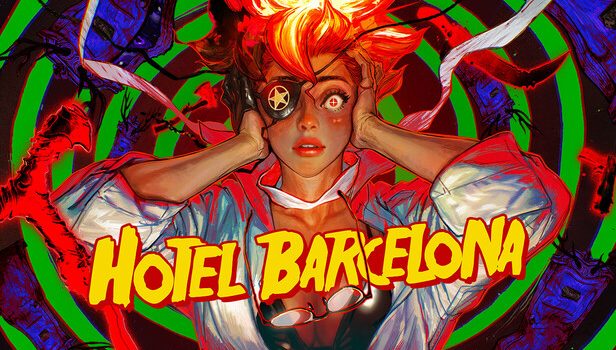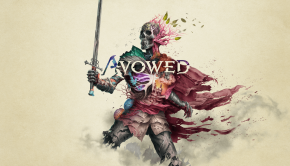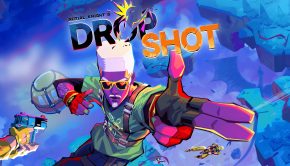Hotel Barcelona Review (PS5)
Summary: Hotel Barcelona is a blood-soaked, 2.5D slasher action game where you play as Justine, a federal marshal unwillingly sharing a mind with the murderous Dr. Carnival, navigating a hotel full of America’s most dangerous killers. The game mixes intense combat, roguelite mechanics, and branching exploration with quirky NPCs, phantoms from past runs, and risk-reward systems, but many of these ideas feel more like flashes of promise than fully realized features. Its punk-inspired aesthetic, grim humor, and aggressive style give it a distinct personality, yet the short runtime and underused mechanics make the overall experience feel lighter than it should be.
3
Suite Strangeness
Check your expectations at the door…Hotel Barcelona has other plans! Hotel Barcelona is a blood-soaked, 2.5D slasher action game that sees the collaboration of two legendary and idiosyncratic creators, SUDA51 (No More Heroes, Killer7) and Swery65 (Deadly Premonition, The Good Life). The game is developed by White Owls Inc., published by CULT Games, and released on September 26th of 2025 for PlayStation 5, Xbox Series X|S, and PC via Steam. It blends roguelite mechanics with intense, side-scrolling combat, steeped in a darkly humorous and surreal aesthetic. Hotel Barcelona is a chaotic, stylish ride through seven horror-themed zones, where you must battle possessed killers while uncovering a story that mixes mystery, introspection, and grotesque spectacle which is a perfect storm of Swery and Suda’s cult sensibilities. From the outset, it is clear that this is not a traditional slasher; the game operates on multiple levels, offering players a bizarre, almost meta-narrative experience that balances grotesque humor, horror, and the occasional philosophical moment.
Justine is an inexperienced federal marshal driven by revenge for her father’s untimely death, who also harbors the soul of Dr. Carnival, a sadistic murderer with a penchant for theatrical monologues. Following a car crash, Justine awakens at Hotel Barcelona, a luxurious, but eerily isolated establishment that conceals America’s most dangerous serial killers. As you progress, you uncover secrets about Justine’s father, her own psyche, and broader existential questions, all filtered through the lens of Dr. Carnival’s violent worldview.
The story is bolstered by quirky, memorable characters and smart, introspective dialogue, though its short runtime and occasionally disjointed pacing prevent it from fully realizing the depth of its narrative ambitions. The dialogue between Justine and Dr. Carnival is particularly compelling, often serving as a darkly humorous counterpoint to the blood-soaked carnage unfolding on screen. While some narrative beats feel rushed or underdeveloped, there are moments of genuine philosophical introspection that touch on justice, human nature, and the idea of self-improvement through adversity. Some might find the dialogue bad or cheesy, but those adept with the creators’ flavor of storytelling will understand how it’s outlined. The characters inhabiting the hotel, from the unsettlingly cheerful front desk clerk to the monstrous yet strangely endearing Tim in the closet, further add texture and personality to the story, even if the overarching plot occasionally feels like it’s skimming the surface.
Gameplay in Hotel Barcelona is both intricate and, at times, overwhelming, but in a way that rewards curiosity and strategic thinking. Players navigate a 2D field with Justine, using melee and ranged weapons that can be upgraded and enhanced through items collected in-game. These weapons include knives, staves, handguns, axes, and shotguns, each offering unique attack patterns, strengths, and weaknesses. The controls feel pretty bad at first, but you quickly learn that everything you do has to be deliberate to efficiently succeed. Combat is deeply tied to the “Splatter Gauge,” a mechanic fueled by enemy blood that enhances abilities as it fills, culminating in the devastating “Carnival Awakening” attack that unleashes Dr. Carnival’s full power across the screen. The game’s systems encourage aggressive, thoughtful play. Dying is not purely punitive, as it generates “Slasher Phantoms,” echoes of past runs that can deal real damage to enemies or act as tactical diversions. The roguelite elements, such as losing collected items after a run and strategically deploying phantoms, create layers of depth that reward repeated playthroughs.
The Hotel itself acts as a central hub, populated with eccentric NPCs who offer upgrades, side quests, or simply entertain. Vanessa at the front desk allows players to place “Special Requests,” a risk-reward system where certain restrictions increase potential rewards, while Charles the bartender trades ears for items like Re-Entry Tickets that let you retry boss encounters. The Ranger, Monica, unlocks different weapons, and there are several optional interactions, including a mirror for conversing directly with Dr. Carnival, Mr. Clown for sacrificing hearts, and even a pinball machine for lighthearted diversion. Levels are entered via a map hanging on the wall, leading to environments such as Diamond Lake Campsite or the Long Pig Steakhouse. Each level is divided into screens with a time limit, and doors can branch into different paths, bonus challenges, or casinos where players can gamble for upgrades. The design encourages exploration while balancing risk and reward, with each decision carrying potential consequences for gameplay, loot, and combat readiness.
Justine is a nimble protagonist, capable of double jumps, wall kicks, dropping through platforms, and dodging enemy attacks. These movement options, combined with stamina management, add layers of strategy to both combat and exploration, though some platforming sections can feel stiff due to her slightly awkward controls. Combat is satisfying (to a degree) and visceral; slicing through enemies produces gratifying sound effects, and the blood-fueled mechanics can make encounters feel impactful. Enemies and the environment apply different ailments, such as Fractured, Sticky, or Drenched, which can impede movement or wash away accumulated blood, adding another layer of tactical consideration. Boss encounters, in particular, require mastery of these mechanics, as each is uniquely designed and influenced by classic horror tropes. Utilizing phantoms during boss fights can significantly shift the balance, allowing players to manage multiple fronts and exploit enemy AI in creative ways.
While the combat in Hotel Barcelona can be satisfying, it often feels underwhelming when considered in the broader context of the game. The roguelite elements, like losing collected items such as teeth, bones, and ears upon death, encourage planning, but the short runtime of the game and time limit of the levels means these systems rarely feel meaningful or impactful in the long term. Regular enemies and level design rarely present a serious challenge, and even on higher difficulties, players are rarely pushed to fully master the mechanics. Ironically, the game frequently urges speed and constant movement through its levels, which clashes with the strategic depth that the systems promise, making the combat loop feel inconsistent. Overall, while I enjoyed the core gameplay and found moments of thrill and style, the experience ultimately lacks the substantial “meat” needed to make it feel truly rewarding or fully engaging.
The game also incorporates a time, weather, and environmental system that affects abilities and combat dynamics. For instance, critical hit rates may vary with rain, stamina may regenerate differently at night, and enemy placement can shift based on randomized conditions. The multiple difficulty levels, Easy, Normal, Hard, and Slasher, offer a gradual learning curve, though even standard runs tend to feel manageable due to generous resources and phantom assistance. The multiplayer component adds additional replayability in which up to three players can cooperate to complete missions, or a fourth player can invade as a doppelganger, creating high-stakes cat-and-mouse scenarios that reward coordination, cunning, and mischief. This blend of roguelite mechanics, tactical combat, and cooperative/competitive multiplayer creates a dense, layered experience, even if not all systems feel equally necessary in a single playthrough.
Visually and audibly, Hotel Barcelona is a triumph. Hiroaki’s character portraits are stunning, and the cel-shaded aesthetic works well within the punk-infused horror atmosphere. Environmental design is rich, detailed, and full of subtle references, while boss encounters feature highly stylized, memorable visuals. The audio is equally impressive; voice acting for Justine and Dr. Carnival is excellent, combat sounds feel visceral and satisfying, and the soundtrack injects the game with a punk rock energy that elevates each encounter. These elements combine to create an experience that feels both polished and distinctively chaotic, perfectly complementing the gameplay and narrative design.
Yet the game is not without its missteps. Despite the abundance of mechanics, challenges, and optional systems, much of it feels underutilized, resulting in a shorter-than-expected experience that can feel “half-baked.” The inclusion of what appears to be generative AI in post-game content feels incongruous and disengaging, undermining the otherwise unique narrative and stylistic choices. Furthermore, while the story is engaging and quirky, it occasionally rushes through its own philosophical moments and leaves certain beats unresolved, diminishing the impact of the otherwise rich world. While I was playing, I remembered how the narrative worked in Suda51’s Travis Strikes Again: No More Heroes and how well told that story was and the moments where the game made me sit back and appreciate what it was actually doing. I feel like if Hotel Barcelona slowed down a bit more like that, it would feel more resolute. The game’s relatively short runtime (It took me around six hours on normal to see all the bosses) means that many of its systems, while mechanically deep, never fully get a chance to shine, leaving an impression of untapped potential.
Final Thoughts?
Hotel Barcelona delivers a wild, stylish, and often thrilling experience, blending the best of SUDA51 and Swery65’s chaotic sensibilities with clever mechanics, gorgeous visuals, and an audacious sense of humor. Its combat is fun, its world is memorable, and its story, though flawed at times, is engaging in all the right ways. However, the game’s brevity and underused mechanics leave it feeling like it’s missing a larger piece of the puzzle, hinting at the potential for something far greater. Playing through it feels like being promised a full-course steak dinner, only to get a quick salad, a bite of steak with some potatoes, and then being rushed out before dessert. The pieces are there, and what you taste is good, but the meal ends just as it starts to get satisfying. Fans of offbeat, over-the-top action-horror with a cerebral twist will find much to enjoy here, while those expecting a fully realized roguelite epic may leave wanting just a bit more. Nevertheless, for those who revel in the bizarre, the bloody, and the brilliant, Hotel Barcelona provides a uniquely satisfying experience that rewards exploration, experimentation, and repeated play, even if it occasionally teases more than it delivers.


























